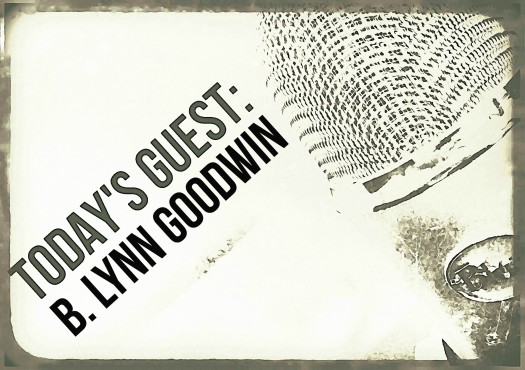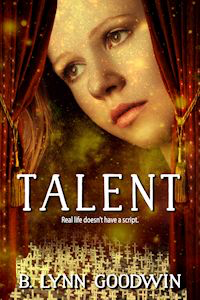Tapping into Universal Truths about Young Adults
By Guest | March 27, 2016 |
 Please welcome B. Lynn Goodwin to Writer Unboxed. Lynn is the owner of Writer Advice and the author of You Want Me to Do WHAT? Journaling for Caregivers (Tate Publishing) and TALENT (Eternal Press). Her stories and articles have been published in Voices of Caregiver, Hip Mama, Small Press Review, Dramatics Magazine, The Sun, Good Housekeeping.com, and many other venues. She is currently working on a memoir about getting married for the first time at age 62.
Please welcome B. Lynn Goodwin to Writer Unboxed. Lynn is the owner of Writer Advice and the author of You Want Me to Do WHAT? Journaling for Caregivers (Tate Publishing) and TALENT (Eternal Press). Her stories and articles have been published in Voices of Caregiver, Hip Mama, Small Press Review, Dramatics Magazine, The Sun, Good Housekeeping.com, and many other venues. She is currently working on a memoir about getting married for the first time at age 62.
Connect with Lynn on Twitter and Facebook.
Tapping into Universal Truths about Young Adults
Communities and technologies change. Emotions do not. Many of the universal truths that existed when I was in high school, long before cell phones or microwave ovens, are still valid today. Teens still want relationships and validation. When they involve themselves in any enterprise, they want to come out on top. They care about their future and plan to improve the world.
One of the kindest things a reviewer said about my novel is, “What intrigues me about B. Lynn Goodwin’s coming-of-age novel, Talent, is how the author manages to maintain the perspective of a 15 ½-year old so clearly and evenly.” Although chronologically I am eligible for Medicare, on the inside, I remember the world as I saw it through my 15-year-old eyes. I understand my character’s desire to find her talent as well as her feelings of powerlessness. I understand her confusion and hesitation about boys, relationships, and her awakening sexuality. I appreciate that it is difficult to be drawn to M&Ms and eat them compulsively when you also want to be slender and svelte. I understand stuffing your feelings, needing a friend, and needing to be recognized for a job well done.
 Teens believe almost anything is possible if you work for it. They have some new tools for achieving their dreams and a technological knowledge that far exceeds mine, but their emotional needs have not changed much, even though many standards for behavior have. Teens want success in relationships, in school, and in activities. They want approval. They want to feel grown up. They want love and reassurance that the world will still exist when they are twenty-one.
Teens believe almost anything is possible if you work for it. They have some new tools for achieving their dreams and a technological knowledge that far exceeds mine, but their emotional needs have not changed much, even though many standards for behavior have. Teens want success in relationships, in school, and in activities. They want approval. They want to feel grown up. They want love and reassurance that the world will still exist when they are twenty-one.
To find out what matters to today’s teens, here are some ways to get to know them. Work with them. Ask them what matters and why.
Volunteer to work with teens on a project of mutual interest. Can you coach, tutor, run a choir, plant trees, or work for a cause? While you are working with kids who share a common interest, listen. Hear them. Talk to them about the choices they make, the issues they face, and their take on the world. Keep listening. When the same issues keep coming up from different people, they are talking about a universal truth for them.
Ask them what they want. Once they tell you, ask what they can do to get it, and what is in their way. Their answers may surprise you. Teens want freedom from rules and restrictions. They want to run their lives. How teens strive for freedom and what gets in their way makes each story unique. Look for universal motivations.
Read student essays. You can find them in Teen Ink. Google it. You can find them in high school essay contests. You can ask local teachers to have their students write about what matters to them. Or have teachers ask students to write about the issues they want to read about in books. What matters is almost always connected to their universal truths.
Use yourself as a resource. Remember what your life was like as a teenager—not the clothes you wore or the classes you took or the teams you were on so much as the way you felt about yourself and your world. Remember when you felt like rebelling? Remember when you were ready to move out? What fueled those thoughts? Did you act on them or not? Why?
Check out parenting sites. What issues do they say matter to kids? Ask teens how they feel about these issues.
Kids who trust you will tell you the truth. They expect the same from you. If they ask why you want to know about them, tell the truth. They’ll love being the subject of your research and having their ideas shared in a book. Your writing can help reassure them that they are understood and appreciated.
What are some ways you learn about your young adult readers? How do you discover individual and universal truths?










Great tips on writing authentic teenagers. I truly believe if you live to be an adult, you had to figure out some universal truths. This is one of the reasons I love writing for children because it is a time of intense growth and putting aside childish notions is bittersweet. You realize your parents are not perfect, they cannot always protect you, that life is unfair, love is sweet, life is sweet, friends can betray you, love can hurt, that you are invincible. Like you, my inner child is very much alive and I tap into those emotions while writing.
Happy Easter!
I love this response. Clearly the child you once were lives on, regardless of chronological age. What are you writing?
Lynn
http://www.writeradvice.com
I talk with my teen-aged child. I also remember my teen years.
I used to teach teen-aged children, but when I directed the high school plays, I thought of the same students as actors, not children or teenagers. Often, but not always, that carried over into the classroom.
Have you shared TALENT with your teenager? It’s available on Amazon, https://www.amazon.com/Talent-B-Lynn-Goodwin/dp/1629293350/ref=sr_1_1?ie=UTF8&qid=1450916910&sr=8-1&keywords=9781629293356 (You might want to cut and paste that. =)
Have a few. It takes a while to grow them to the right size, but they have some entertainment value even then.
Then be quick: you have 7 years per in which they are technically ‘teen’ – and I wouldn’t include 13 and 18 as prime teen years: the younger ones don’t know anything yet, and the older ones are ‘adults.’
Just right down everything they say. I wish I had.
LOL, I have two right now :)
You can’t make this stuff up. Well, I guess you can make some of it up. Some of TALENT came from specific memories and moments. Some was invented. Certainly all the characters were invented.
Lynn
http://www.writeradvice.com
I remember asking a YA author friend how she was able to think like a teenager. She mentioned many of the same things you did. When I began to write picture books I was surprised at how easily the voice came. It helped me to recall my years caring for the age group. But in order to get into the head of my characters I had to remember myself at that age. At first it seemed like a challenge, but the more I write the easier it gets.
I could not agree more. Do these responses count as writing? What is the best picture book you ever wrote?
Lynn
http://www.writeradvice.com
Great post!
Thanks! You would do well at flash fiction. You get right to the point. =)
Lynn
http://www.writeradvice.com
Great post that made me remember my own teen years. Listening to the dialogue between kids who attend my neighbourhood school is my secret weapon for writing authentic scenes.
Love that weapon. For several years I’ve gone to the Starbuck’s next to the high school where TALENT takes place. Admittedly there is a new theatre and an entire new faculty, staff, and administration, to say nothing of new students. Some could be the grandchildren of the people I cast in Oklahoma! in 1979. I love listening to them and imagining who might take drama.
What did you remember about your teen years?
Lynn
http://www.writeradvice.com
Living in the present, feeling everything intensely, realizing your parents will die one day, and having FIRSTS!
For my novel, One Is Not A Lonely Number, features a 13 year old narrator. She is an only child and I’m one of six. I interviewed “onlies”–both teens and adults. Then I imagined what it would have been like for me without siblings.
Great approach. Imagining the situation can bring up all kinds of ideas, as you and I both know.
I hope your novel is doing well. It sounds intriguing.
Thanks,
Lynn
Writer Advice Managing Editor, http://www.writeradvice.com
Author of YOU WANT ME TO DO WHAT? Journaling for Caregivers & Author of TALENT
blynngoodwin.com